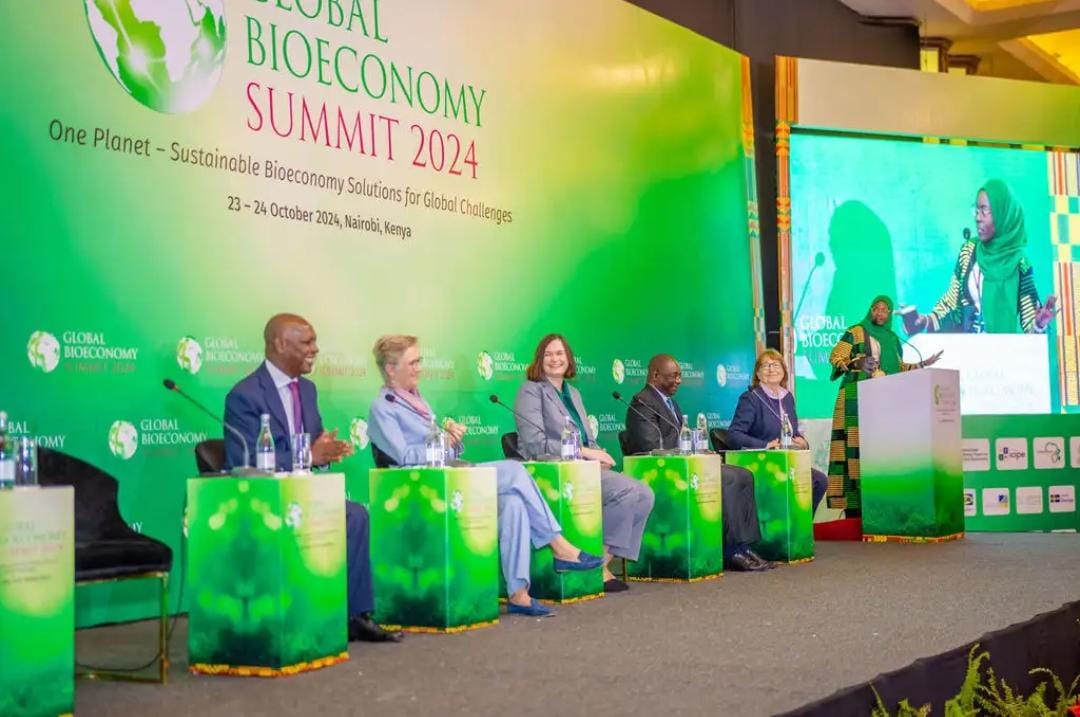Nairobi Hosts Fourth Global Bioeconomy Summit Amid Calls for Sustainable Solutions

The International Advisory Council on Global Bioeconomy (IACGB) convened its fourth Global Bioeconomy Summit (GBS) in Nairobi under the theme “One Planet – Sustainable Bioeconomy Solutions for Global Challenges.” This event, held in collaboration with East African partners such as the International Centre of Insect Physiology and Ecology (icipe), the East African Science and Technology Commission (EASTECO), and the Stockholm Environment Institute (SEI), marks a significant milestone as the first summit outside Germany since its inception in 2015.

The summit brought together experts from various sectors—including politics, science, civil society, and business—to engage in critical discussions on bioeconomy issues.
In his opening address, Dr. Andrew Karanja, the Cabinet Secretary for Agriculture and Livestock Development, emphasized the vital role of bioeconomy in Kenya’s sustainable development agenda. “As we gather here today, we are not just discussing an economic model; we are shaping a future where sustainability drives innovation and growth,” he stated.
He highlighted the importance of collaboration across sectors and the need to harness local resources to enhance food security and create jobs. “We must empower our youth and communities to take part in this transformation,” he said, urging participants to share knowledge and best practices. “Together, we can build a resilient bioeconomy that benefits all Kenyans and contributes to global efforts against climate change.”
In his address, Dr. Abdou Tenkouano, Director General and CEO of icipe highlighted the urgent need for sustainable growth in light of the United Nations’ projection that the global population will reach 9.7 billion by 2050. He emphasized that the bioeconomy represents a vital pathway for meeting food, nutritional, and health needs while minimizing environmental impact.
“By embracing the bioeconomy, we can address not only the challenges of food security and health but also provide employment opportunities for the youth, who represent a significant demographic in Africa,” he stated. “This summit is a crucial platform for connecting the African bioeconomy with global initiatives, fostering collaboration, and sharing best practices.”
Fortunate Muyambi, Deputy Executive Secretary for Projects and Programmes at the East African Science and Technology Commission, expressed gratitude to the International Council on Bioeconomy and partner organizations for their efforts in bringing the summit to Africa. “This event is an exciting opportunity for the East African community to engage with global bioeconomy experts,” he stated.
“We hope to connect with partners who can help drive forward the Sustainable Development Goals,” Muyambi emphasized, underlining the importance of collaboration in achieving long-term impact.
Mr. Philip Osano, Director of the Stockholm Environment Institute Africa Centre, also stressed the critical role of bioeconomy in addressing pressing environmental issues. He thanked the Kenyan government for its support, highlighting the collaborative effort necessary for the summit’s success.
Osano pointed out the unique challenges faced by Africa, noting the alarming rate of post-harvest food loss, which affects up to 50% of agricultural output on the continent. He advocated for investments in value addition processes to enhance food security and reduce waste. Furthermore, he addressed issues of land degradation and the need for sustainable agricultural practices, including bio-based innovations in energy and construction.
Transforming the Economy
The bioeconomy leverages renewable biological resources to reduce reliance on fossil fuels, promote sustainable economic growth, and enhance food security. By supporting environmentally friendly practices, the bioeconomy can strengthen resilient food systems, create jobs, and address global health challenges.
Currently, over 65 countries have adopted dedicated bioeconomy strategies, recognizing its potential as a catalyst for sustainable development. Major economies, including the United States and China, as well as regional blocs like the European Union and the East African Community, are actively pursuing bioeconomy initiatives.





